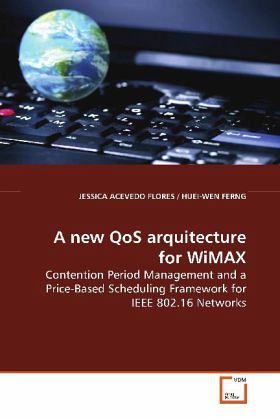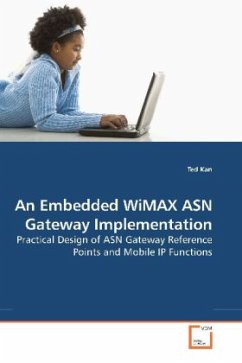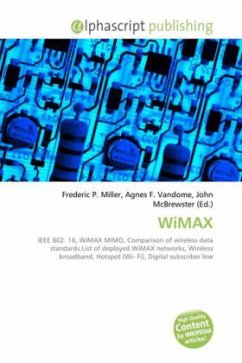
A new QoS arquitecture for WiMAX
Contention Period Management and a Price-Based Scheduling Framework for IEEE 802.16 Networks
Versandkostenfrei!
Versandfertig in 6-10 Tagen
32,99 €
inkl. MwSt.

PAYBACK Punkte
16 °P sammeln!
This research proposes a quality of service (QoS)architecture for WiMAX, including a contention periodmanagement algorithm and a price-based schedulingframework. With a derived probability-based optimalcontention window (P-OCW), we were able to devise acontention slot allocation algorithm to allocatecontention minislots to flows based on P-OCW. Inaddition, a price-based scheduling framework wasdeveloped to provide price differentiation amongusers. This scheduling framework was designed to workusing the TDD mode to take advantage of the adaptivesubframe size as well as schedulers of adaptivepri...
This research proposes a quality of service (QoS)
architecture for WiMAX, including a contention period
management algorithm and a price-based scheduling
framework. With a derived probability-based optimal
contention window (P-OCW), we were able to devise a
contention slot allocation algorithm to allocate
contention minislots to flows based on P-OCW. In
addition, a price-based scheduling framework was
developed to provide price differentiation among
users. This scheduling framework was designed to work
using the TDD mode to take advantage of the adaptive
subframe size as well as schedulers of adaptive
price-based deficit round robin (AP-DRR) and
price-based distributed deficit round robin (APDDRR).
From simulation results, we strongly recommend the
use of our contention slot allocation algorithm and
adaptive price-based scheduling framework.
architecture for WiMAX, including a contention period
management algorithm and a price-based scheduling
framework. With a derived probability-based optimal
contention window (P-OCW), we were able to devise a
contention slot allocation algorithm to allocate
contention minislots to flows based on P-OCW. In
addition, a price-based scheduling framework was
developed to provide price differentiation among
users. This scheduling framework was designed to work
using the TDD mode to take advantage of the adaptive
subframe size as well as schedulers of adaptive
price-based deficit round robin (AP-DRR) and
price-based distributed deficit round robin (APDDRR).
From simulation results, we strongly recommend the
use of our contention slot allocation algorithm and
adaptive price-based scheduling framework.












